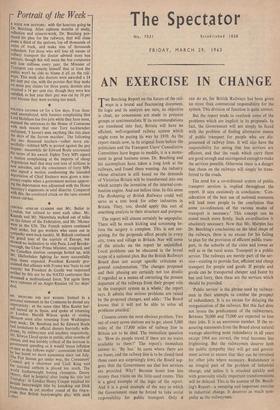AN EXERCISE IN CHANGE
rrHE Beeching Report on the future of the rail- ' ways is a brutal and fascinating document. Its logic and its analysis are sure, its objective is clear, no concessions are made to pressure groups or sentimentalists. If its recommendations are translated into fact, Britain will have an efficient, well-organised railway system which might even be paying its way by 1970. As the report stands now, in its original form before the politicians and the Transport Users' Consultative Committees have begun to meddle, it is a monu- ment to good business sense. Dr. Beeching and his accomplices have taken a long look at the railways, and found them wanting. An industry whose structure is still based on the demands of Victorian Britain will be transformed into one which accepts the invention of the internal-com- bustion engine. And not before time. In this sense The Reshaping of British Railways could well serve as a text book for other industries in Britain. They, too, should apply this sort of searching analysis to their structure and purpose.
The report will almost certainly be unpopular. There will be much kicking and screaming be- fore the surgery is complete. This is not sur- prising, for the proposals affect people in every city, town and village in Britain. Nor will some of the attacks on the report be unjustified. Local problems can be obscured in the broad scope of a national plan. But the British Railways Board does not accept specific criticisms as general condemnation. 'The changes proposed and their phasing are certainly not too drastic if regarded as a means of correcting the present departure of the railways from their proper role in the transport system as a whole,' the report says. It admits that serious problems are raised by the proposed changes, and adds: 'The Board knows that it will not be able to solve all problems unaided.'
Closures create the most obvious problem. Two out of every seven stations are to go; about 5,000 miles of the 17,800 miles of railway line in Britain are to be shed. The immediate question is: 'How do people travel if there are no trains available to them?' The report's immediate answer is : 'By bus.' In cases where there are no buses, and the railway line is to be closed (and those cases are surprisingly few), the Board sug- gests that the Government see that bus services are provided. Why? Because buses lose less money than trains on the little-used routes. This is a good example of the logic of the report. And it is a good example of the way in which the Government must be forced to take social responsibility for public transport. Only it can do so, for British Railways has been given no more than commercial responsibility for the system. This division of function is quite correct.
But the report tends to overlook some of the problems which are implicit in its proposals. In fact, the Government will not simply be faced with the problem of finding alternative means of public transport for people who are dis- possessed of railway lines. It will also have the responsibility for seeing that bus services are efficient, and that the roads which carry them are good enough and uncongested enough to make the services possible. Otherwise there is a danger that chaos on the railways will simply be trans- ferred to the roads.
The need for a co-ordinated system of public transport services is implied throughout the report. It says cautiously in conclusion: 'Con- sideration of the best use of national resources will lead most people to the conclusion that some co-ordination of the various modes of transport is necessary.' This concept can be stated much more firmly. Such co-ordination is absolutely necessary. Now that Mr. Marples has Dr. Beeching's conclusions on the ideal shape of the railways, there is no excuse for his failing to plan for the provision of efficient public trans- port, in the suburbs of the cities and towns as well as in the rural areas. Transport is a public service. The railways are merely part of the ser- vice—existing to provide fast, efficient and cheap transport for people and goods. If people and goods can be transported cheaper and faster by bus and lorry, then these are the services which should be provided.
`Public service' is the phrase used by railway- men in their attempts to combat the prospect of redundancy. It is no excuse for delaying the reorganisation of the railways. But this fact does not lessen the predicament of the railwaymen. Between 70,000 and 75,000 are expected to lose their jobs. It is an enormous number. If the re- assuring statements from the Board about natural wastage absorbing most redundancy in all years except 1964 are correct, the total becomes less frightening. But the railwaymen deserve both the public sympathy they will get and govern- ment action to ensure that they can be retrained for other jobs where necessary. Redundancy is an integral part of the problem of industrial change, and unless it is attacked quickly and with generosity vitally important transformations will be delayed. This is the essence of Dr. Beech- ing's Report—a sweeping and important exercise in industrial change. It deserves as much sym- pathy as the railwaymen.














































 Previous page
Previous page